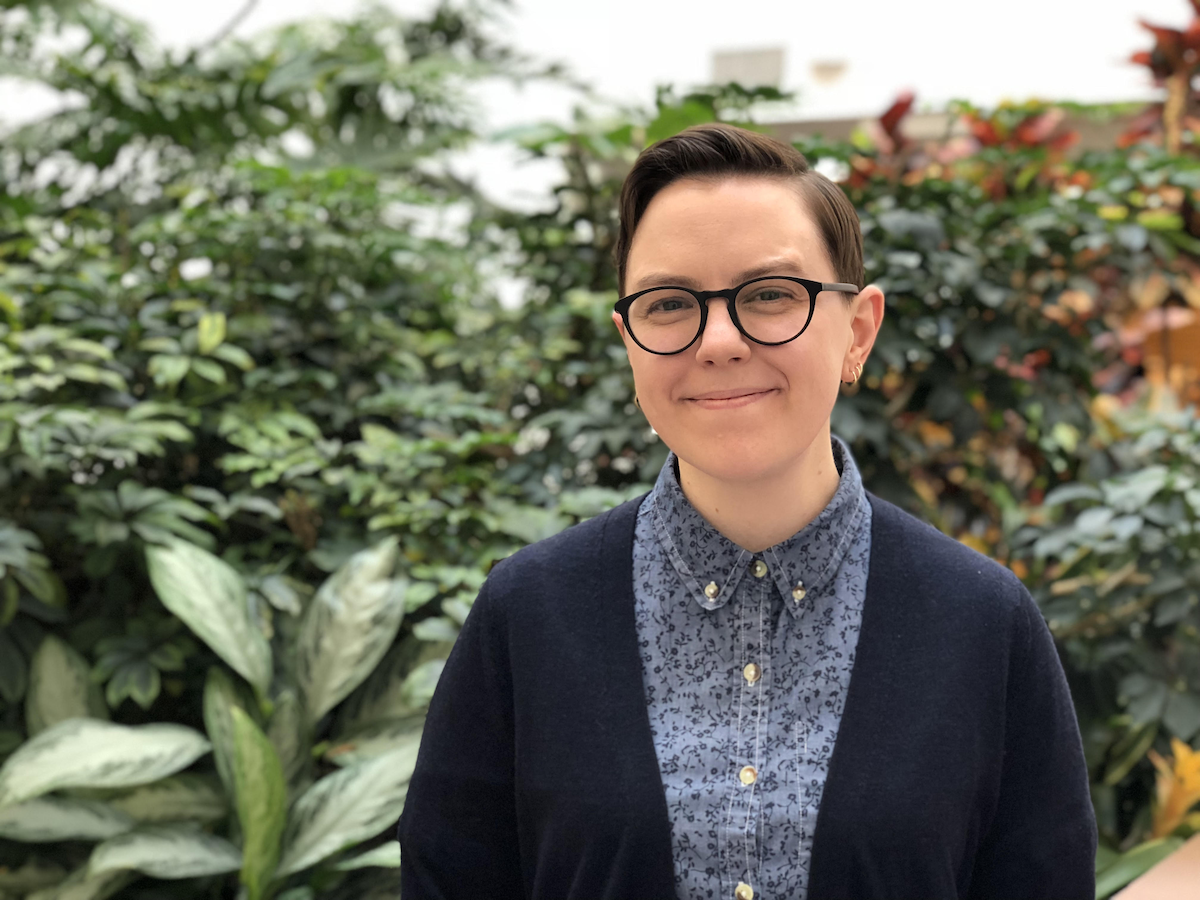Mobile Menu
- Education
- Faculty
- Research
- News & Events
- Divisions
- Equity, Diversity & Inclusion
- About Us

It was in the earliest days of Dr. Helena Frecker’s medical training at the University of Toronto that a course in community health helped to crystallize her career focus.
An undergrad student who had not yet completed clerkship at the time, Frecker — now an assistant professor in our Department — took a course in community health that prompted her to seek out a project with Sherbourne Health Centre. The project’s goal was to evaluate the success of a program called Gender Journeys, which aimed to help people navigate their transition.
“That was when I first started to really dig into the struggles and challenges that the gender-diverse community faces and to learn about the aspects of their care that were sub-optimal,” Frecker recalls.
“That’s where it started. Since then, it’s been a bit of a journey.”
From there, as Frecker proceeded through residency and eventually completed a fellowship in minimally invasive gynaecologic surgery in our Department, she vigorously pursued opportunities to learn more about the experiences of the gender-diverse community.
To gain knowledge about phalloplasty and vaginoplasty procedures, she completed a surgical observership at GrS Montreal with Dr. Pierre Brassard, and brought back what she learned to educate her colleagues. During fellowship, she conducted research exploring the experiences of trans men seeking reproductive care in gynaecology clinics, as well as another project looking at reproductive health considerations in sexual and/or gender-minority adolescents.
Finally, in 2018, Frecker and two fellow Michael Garron Hospital-affiliated ob-gyn faculty members, Dr. Melanie Ornstein and Dr. Elin Raymond, decided to rebrand their clinic as Open Arms Ob/Gyn. In doing so, they reframed the clinic’s goal to provide equal access to compassionate, patient-centred, and evidence-based reproductive and gynaecologic health care.
“When I started my own practice, I was certain right from the beginning that the gender-diverse and queer communities would be a focus,” Frecker says. “I am part of the queer community; it always made sense to try and help my people where I can.
“Now, whether my referral base comes from my public speaking or through word of mouth from the community, I think a quarter of my practice is seeing LGBTQ+ and gender-diverse people. For that corner of my practice, the area I primarily focus on is providing gender-affirming surgery for trans men in the form of hysterectomy, but it’s not only that.
“I really try to make my practice a completely safe place for gender-diverse people who might have reproductive or gynaecologic issues, to feel that they can access care in a trauma-informed and gender-affirming way. I think for the most part I’ve been able to achieve that, which is incredibly gratifying.”
Registered midwife Kirsten Schmidt was quick to recommend Frecker when a client of hers — a pregnant trans man — reached out looking for an obstetrician-gynaecologist.
Over the course of what Schmidt describes as an “incredibly complicated pregnancy,” both she and her client were deeply impressed by the quality and sensitivity of Frecker’s care.
“She was always fantastic with him,” Schmidt recalls. “She went above and beyond in terms of providing care and making sure her whole office knew which pronouns to use. Since he was going to have a scheduled C-section, Helena made a care plan for him to make sure he was supported the whole time he was at the hospital.
“I ended up being able to come down for the C-section to support him. Just watching Helena interact with him and seeing how attentive and respectful she was — it was magical.
“He couldn’t have asked for better care. He was absolutely thrilled to pieces with the whole experience.”
Dr. Mark Yudin, a professor in our Department, has known Frecker since her earliest days of medical school. He recalls being immediately impressed both with Frecker’s academic ambition, as well as her dedication to working with the gender-diverse community.
“From an academic point of view, I always thought she was a superstar — I was quite taken with her initiative, her drive, and her passion,” Yudin said. “Dr. Frecker had that same passion and dedication about providing comprehensive and safe care for this community, well before many other physicians might have really understood the challenges these individuals face in accessing safe care.
“You could use words like ‘pioneer’ or ‘trailblazer’ for her. And when it comes to her clinical practice, she is really at the forefront of trying to push that care model and trying to provide a safe and comfortable space in that community.”
Yudin also credits Frecker for balancing her clinical and academic work with other interests. Frecker — who as a teen pondered a career as a rock musician before pursuing medicine — still plays guitar, bass, and other stringed instruments and performs in a choir of women physicians called Voices Rock Medicine.
“To me, she’s a really amazing role model for medical students and residents,” Yudin said. “She has a strong clinical practice, she’s a successful academic, and she has her own rich personal life outside of medicine. I think it’s important for our trainees to see that.”
Over the years, Frecker has also become a prolific public speaker, delivering city-wide educational presentations to healthcare providers regarding care for gender-diverse people.
Given the deep experience she has accrued with the gender-diverse community in her research and clinical practice, Frecker sees advocacy as a vitally important — even necessary — dimension of her work.
“I do feel it’s my responsibility to share as much of my experience as I can with my colleagues,” Frecker says. “I feel almost obliged to the community to carry on and teach as much as I can, but I don’t see that as a burden. I see it as an opportunity.”
